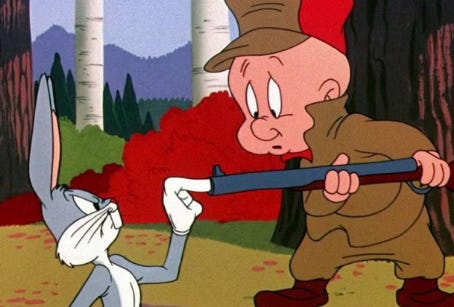Elmer Fudd is a classic woven into the society and animation tapestry for over 80 years. It’s hard not to think of him without his nemesis, Bugs Bunny, but I hope you’ll learn more about this iconic character here.
The History
Elmer Fudd, one of the most iconic characters in animation, first appeared in the Warner Bros. animated short Elmer's Candid Camera in 1940. Created by Tex Avery and animated by the legendary Chuck Jones, Elmer Fudd quickly became a staple of the Looney Tunes and Merrie Melodies series. He was designed as a comically inept hunter, perpetually pursuing Bugs Bunny. Over the decades, Elmer Fudd has undergone various redesigns and updates to keep pace with the evolving animation landscape, but his core characteristics have remained unchanged.
Critical events in Elmer Fudd's history include his early appearances in the 1940s, where he was often paired with other characters like Daffy Duck, and his continued presence in various Warner Bros. productions through the decades. In the 1950s and 1960s, Elmer Fudd became a television fixture as Looney Tunes shorts were repackaged for TV audiences. More recently, Elmer Fudd has appeared in modern animations like The Looney Tunes Show (2011-2014) and Looney Tunes Cartoons (2020-present), showing his lasting appeal.
The Characters
Be vewy, vewy quiet, I'm hunting wabbits
Elmer Fudd is best known for his distinct speech impediment, pronouncing "r" and "l" as "w", making famous lines like "Be vewy, vewy quiet, I'm hunting wabbits" instantly recognisable. He is often characterised by his hunter's attire—complete with a hat and rifle—though in some cartoons, he has been depicted in various other roles, from a dim-witted city dweller to a hapless farmer.
Bugs Bunny, Elmer's perennial nemesis, is the quick-witted, carrot-munching rabbit who often outsmarts Elmer. Their dynamic is a classic example of the hunter versus prey trope turned on its head, with Bugs frequently getting the better of Elmer through clever tricks and slapstick humour.
Plotlines
The general plotlines of Elmer Fudd's cartoons typically revolve around his futile attempts to catch Bugs Bunny. These episodes are characterised by Elmer's elaborate and humorous schemes, which are thwarted by Bugs' superior wit. The plots are often set in diverse locations, ranging from forests and farms to urban environments, and sometimes take on fantastical elements.
In addition to his pursuits of Bugs, Elmer Fudd has starred in episodes with other Looney Tunes characters. For example, his interactions with Daffy Duck often lead to comedic misunderstandings and slapstick conflict.
Famous People
Many famous people have cited Looney Tunes, and by extension, Elmer Fudd, as a significant influence on their work and sense of humour. Filmmakers like Steven Spielberg have admired the classic shorts' technical craftsmanship and comedic timing. Voice actors like Billy West and Seth MacFarlane have also noted the impact of Mel Blanc's original portrayal of Elmer Fudd on their careers.
Popular Culture
Elmer Fudd has had a considerable impact on popular culture. He is often referenced in television shows, movies, and even music. His iconic voice and catchphrases have become part of the cultural lexicon. For instance, Elmer's famous line about hunting "wabbits" has been parodied and quoted in countless contexts, highlighting his influence beyond animation.
Societal changes have influenced some updates to the character, especially concerning depictions of violence. In recent years, Warner Bros. decided to depict Elmer without his iconic rifle in new shorts, opting for less violent humour to align with modern sensibilities.
Spin-Offs and Related Work
Elmer Fudd has been featured in various spin-offs and related works, including video games, comic books, and merchandise. Notable spin-offs include appearances in crossover projects like Space Jam (1996) and its sequel, Space Jam: A New Legacy (2021). Elmer Fudd has also been immortalised in toys, clothing, and other memorabilia, cementing his place in pop culture.
Financials
The financial success of the Looney Tunes franchise, including Elmer Fudd, is substantial. Warner Bros. animation division has generated significant revenue from television syndication, home video sales, and merchandise. While specific figures for Elmer Fudd alone are not readily available, the Looney Tunes brand is estimated to have generated billions in revenue over its lifetime.
Legacy
Elmer Fudd's legacy is one of enduring appeal and influence. As a key figure in the golden age of American animation, Elmer represents the innovative spirit and timeless humour that define the Looney Tunes series. His interactions with Bugs Bunny are classic examples of cartoon rivalry, inspiring countless imitators and homages.
Fun Facts
Voice Evolution: Elmer Fudd's voice has evolved over the years. Arthur Q. Bryan initially sang him until 1959, followed by other voice actors, including Mel Blanc and, more recently, Billy West and Jeff Bergman.
Name Origins: Elmer's name was inspired by a hunter character from an early Warner Bros. short titled Elmer's Candid Camera.
Iconic Line: Elmer's catchphrase "Be vewy, vewy quiet, I'm hunting wabbits" was ad-libbed by Arthur Q. Bryan and has since become one of the most memorable lines in animation history.
Conclusion
Elmer Fudd remains a beloved character in the animation world, his charm lying in his perpetual yet endearing failure to catch Bugs Bunny. From his inception in the early 1940s to his presence in modern animated series, Elmer Fudd exemplifies the timeless appeal of Looney Tunes. His impact on popular culture, animation history, and financial success underscores the enduring legacy of this iconic character. With a blend of humour, cleverness, and classic animation, Elmer Fudd continues to entertain and inspire new generations of fans.
Fancy a different read on a similar vibe try the







Vewy vewy quiet. It’s so vivid in everyone’s minds, I imagine. Iconic!
I always thought Mel Blanc voiced Elmer. You learn something new every day even the most familiar domains.